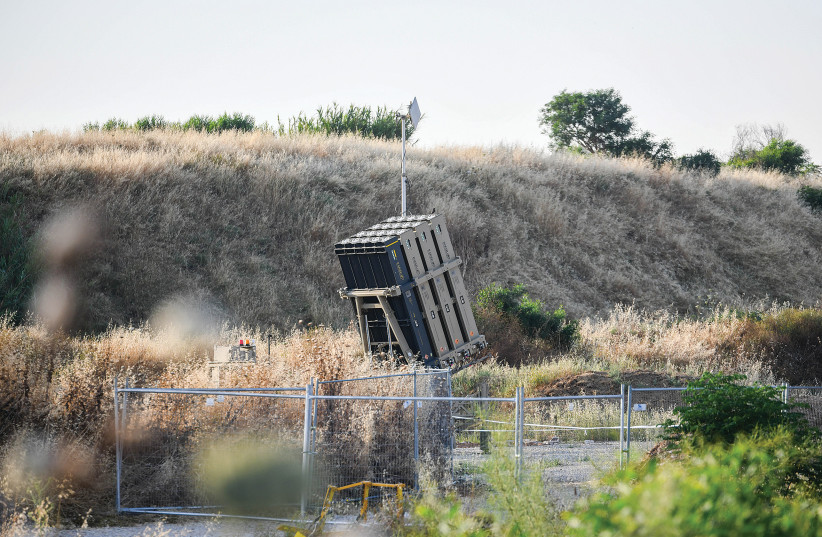The Israeli Air Force struck targets in the Gaza Strip overnight on Tuesday in response to earlier rocket fire launched toward southern Israel.
“Fighter planes attacked a number of targets and destroyed a Hamas weapons production facility,” the IDF Spokesperson’s Unit said in a statement. “Israel regards Hamas as responsible for all events in and from the Strip.”
Hamas spokesperson Hazem Qassem said that there were no injuries in the strikes that targeted a site west of Khan Yunis. He claimed antiaircraft fire was launched at the planes.
The “Zionist bombing of empty sites is a failed attempt to prevent our Palestinians people from defending the city of Jerusalem,” Qassem said.
According to reports, a Russian-made Strela (SA-7) shoulder-to-air missile was fired at Israeli jets.

“The Izzadin al-Qassam Brigades announced that its air defenses responded to the hostile Israeli warplanes at 1:35 a.m. in the skies of the Gaza Strip with surface-to-air missiles,” SAFA news agency reported.
The IDF confirmed that a missile had been fired at the jets.
“The attempt to hit the planes failed, there were no casualties, and no damage was done to the aircraft,” the military said.
Terror groups in the Strip have fired surface-to-air missiles toward Israeli platforms during past operations over Gaza. None have caused any damage, including the strikes on Tuesday morning.
In January, when the IAF was carrying out airstrikes in response to rockets fired toward Tel Aviv, Hamas used the SA-7 against Israeli jets.
The retaliatory airstrikes came in response to a rocket that was fired on Monday evening toward the southern Israeli communities of Kissufim and Ein Hashlosha, for the first time in four months.
During a visit on Tuesday afternoon to the Judea and Samaria Border Police, Defense Minister Benny Gantz warned that Israel would not allow for continued rocket fire from the Hamas-run enclave.
“The IDF is ready with a wide range of means and targets, in order that peace and stability continue,” he said. “If the incitement and rocket fire continues, the terrorist organizations will be severely harmed, as will the people of Gaza, who are currently benefiting from the moves we have made to develop the economy and allow [them] to work in Israel. These are moves that we will expand if the stability continues or we can revoke them, if the Hamas leaders decide to harm it.”
Gantz spoke after he held a working meeting with Erez Sidon of the Crossing Points Authority in the Defense Ministry and Border Police Commander Superintendent Amir Cohen at the Sha’ar Ephraim crossing, where the officials discussed the expansion of the crossing’s activities.
The rocket fire comes amid rising tensions surrounding the Temple Mount, as dozens of Palestinians have been injured and hundreds arrested following violent clashes with Israeli police.
Touching on the violence in Jerusalem, the defense minister said that he has spoken to leaders of regional countries and told them that Israel maintains the status quo in the Temple Mount, “and we will not allow terrorists and provocateurs [to] commit crimes in holy places.”
In the West Bank meanwhile, the IDF continued to carry out arrest raids, taking into custody five wanted Palestinians.
On Monday, 18-year-old Hanan Khadour from the town of Fakua near Jenin died from wounds she sustained during an IDF raid on Jenin 10 days ago. Israeli troops were in Jenin to arrest Palestinians suspected of being involved in the deadly Tel Aviv terrorist attack on April 7.
Khadour was shot in the stomach during clashes between armed Palestinians and Israeli security forces while in a taxi on her way home from a private lesson to prepare for her high school matriculation exams.
The Palestinian Health Ministry claimed that she was killed by Israeli fire. The IDF Spokesperson’s Unit said they were investigating the claims.
Israel Police also announced that the detention of 20 suspects who were arrested during riots in Jerusalem’s Old City and Temple Mount will be extended. The suspects were arrested for rioting, assault and hurling rocks and fireworks toward security forces and civilians over the past week.
Israeli officials understand that Hamas is not interested in any conflict, and the rocket on Monday evening is believed to have been fired by Palestinian Islamic Jihad. Nevertheless, the major concern of the defense establishment is that the violence in Jerusalem might spiral and lead to more rocket fire, and thus drag the country into another war.
Last year’s violence on the Temple Mount coupled with the cancellation of Palestinian elections led to Hamas firing seven rockets toward Jerusalem, which lead to 11 days of deadly conflict called Operation Guardian of the Walls.
